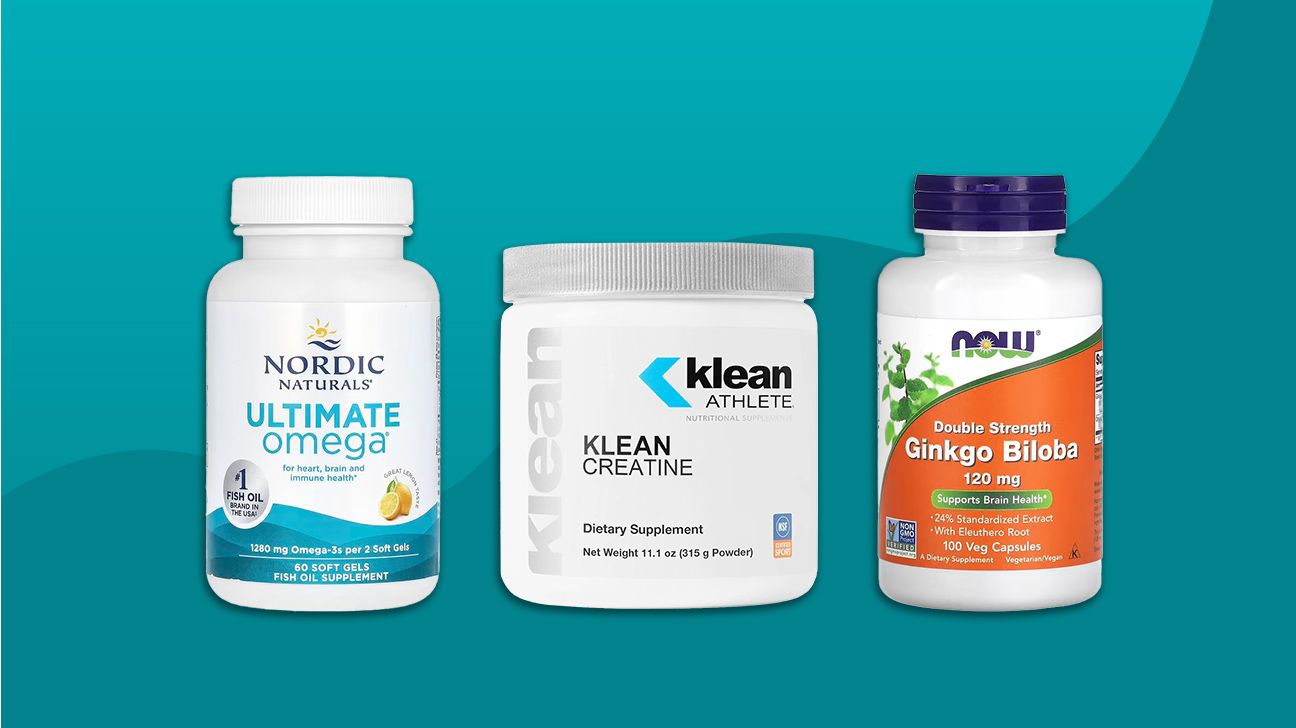Key takeaways
- More human research is still needed to confirm the benefits and safety of most nootropic supplements. None are FDA-approved for brain function.
- Fish oil, ginkgo biloba, and creatine are three options.
- We recommend Nordic Naturals Ultimate Omega Soft Gels and Pure Encapsulations Ginkgo 50, among a few other products that are generally well-tolerated.

Nootropics are a category of supplements or drugs linked with beneficial effects on brain function.
Supporters of nootropics say they can boost memory, motivation, creativity, alertness, general cognitive function, and may also reduce age-related decline in brain function. That said, more research is needed to understand how many of these supplements affect overall brain health.
There is a lack of evidence to support many nootropics as both beneficial and safe. It’s important to discuss adding any supplements to your diet with your trusted healthcare professional.
We’ve dug into some research and suggested some potential options, but it’s crucial to read about any potential side effects before you start adding them to your regimen.
Here is more about the best nootropic supplements and what current scientific evidence says.
Fish oil supplements are a rich source of docosahexaenoic acid (DHA) and eicosapentaenoic acid (EPA), two types of omega-3 fatty acids. These fatty acids have been linked with many health benefits, including possibly improving brain health.
DHA plays a vital role in maintaining the structure and function of your brain. In fact, it accounts for around 40% of total omega-3s in the brain’s tissue.
A 2022 systematic review showed that taking DHA supplements was linked with improved thinking skills in study participants. The average age of study participants was 45 years.
Older research suggests DHA supplementation may help improve memory and reaction times in healthy young people with low DHA intakes. DHA has been shown to be promising for people experiencing a mild decline in brain function.
EPA, the other omega-3 fatty acid in fish oil, has anti-inflammatory effects that may protect the brain against damage and aging.
Unlike DHA, EPA isn’t always linked with improved brain function. Research is mixed. However, in people with depression, it has been associated with benefits like improved mood.
Research looking at taking fish oil, which contains both of these fats, suggests it may help reduce the decline in brain function associated with aging.
Overall, the best way to get the
If you can’t manage this, then taking a supplement could be beneficial. If you’re considering supplementation, be sure to talk with a healthcare professional first to determine if it’s right for you.
Creatine is a natural substance that plays an important role in energy metabolism. It’s found naturally in the body, mostly in muscles and in smaller amounts in the brain.
A 2024 research review showed that creatine supplementation improved memory and processing time but did not indicate significant improvements to overall cognitive function.
A 2020 review of research evaluating creatine use in vegetarian and omnivorous athletes showed that creatine supplements improved memory and thinking skills in the vegetarian athletes. Researchers noted that the review studies likely had a reasonable to higher level of bias, indicating that more research is needed.
Although creatine is a popular supplement, it’s also found in some foods, namely animal products like meat, fish, and eggs.
If you wish to try supplementing, this is one of our top picks.
Ginkgo biloba is promoted as beneficial for short-term memory and thinking skills, and preventing age-related decline in brain function. However, results are inconsistent.
Ginkgo biloba is thought to work by increasing blood flow to the brain, but there’s no conclusive evidence that ginkgo is helpful for brain function.
A 2021 study in mice supports claims that the herbal supplement may act as a protective measure that can help improve brain functions like focus and memory.
A 2023 research review evaluated 1,642 participants across 18 randomized controlled trials. Results indicated that ginkgo biloba used alongside dementia medication, specifically donepezil, may improve vocabulary. But more research was recommended.
An older study evaluated the use of ginkgo biloba supplementation in cognitively intact older adults ages 60 years and older. The study involved participants taking ginkgo biloba supplements. Results indicated the supplementation helped
An updated 2020 research review concluded that 240 mg daily for 24 weeks may improve cognitive function in people with mild dementia.
However, when looking at preventing dementia,
Some supplements show promising results for improving and protecting brain health.
However, it’s important to remember that many brain-boosting supplements are only effective for people who have a mental health condition or have a deficiency in the supplemented nutrient.






